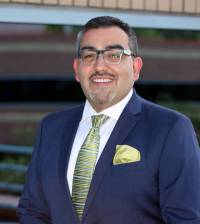 Francisco Durán, Superintendent
Francisco Durán, Superintendent
Arlington Public Schools, Virginia
28,020 students, 4,937 full-time staff
On prioritization: Assuming the superintendency in the midst of a pandemic is not on any educator’s bucket list, but that’s what Durán, who previously served as chief academic and equity officer for a neighboring district, did in June. The long-time school leader said the turbulence of 2020 demands that administrators recognize what’s essential and what’s not. “What I've done is to try and work [with the school board and staff] and say, you know what, between now and the opening of school and really throughout the fall, we need to prioritize returning to school. There's a lot of other things we normally do that we need to take off the table. Just set them aside for now. We actually did a retreat with our board and my leadership team and we identified some of those things. So that's one thing I think is helping model for others how to prioritize.”
On self-care: Durán’s emphasis on setting priorities extends to physical and mental wellness. “Right now I take walks every day just to decompress and start each day anew and fresh. I meditate regularly to keep myself in balance. So those are personal things I've done to help say, what’s a priority in my life right now?”
Leadership lesson: This year has solidified several lessons for Durán, including the idea of “going slow to go fast.” When his team began to assess reopening options, for example, they created a task force that conducted community and staff surveys. Skipping those steps might have expedited decision making but Durán reminded his team that “it’s important to listen, to bring people’s voice in, to think it through.” Doing so not only yielded useful suggestions but helped identify what questions and misinformation were circulating in the community. “There's a lot of information and wondering out there of, ‘Well, why can't we just do this? Why can't we just have everyone come every day?'" he said. "And so I had to really reaffirm (in the July board meeting) that we’re looking at our health information from our state health department and the CDC.”
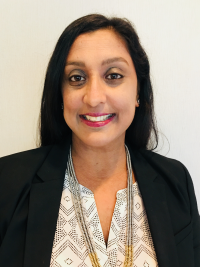 Sonal Patel, Assistant Superintendent of Educational Services
Sonal Patel, Assistant Superintendent of Educational Services
San Leandro Unified School District, California
9,056 students, 978 full-time staff
On dealing with dual pandemics: Patel spoke with MindShift just a week after the police killing of George Floyd sparked nationwide protests, and a month and half after a police officer fatally shot another Black man, Steven Taylor, in her own community. “Personally, I feel mad and hurt and overwhelmed by my own thoughts and emotions. It can be tough to be a leader while you're processing that in real time,” Patel said. “Even though I've been developing my stance as an anti-racist educator for years, watching the world and our communities have to hold this kind of rage right now is very difficult," she said. In addition to the logistics of reopening schools, "we're also battling this other corrosive virus plaguing our schools – white supremacy," she said. "I think at times like this, schools become a really great place for people to find solidarity and comfort and to work through their emotions and thoughts and need for dialogue. To not be able to have that open for our students and families, (and for) our staff and our leaders in these coming weeks is tricky. So I’m just kind of thinking about how we go about doing that.”
On self-care: With two teenagers and a spouse at home competing for space and bandwidth, Patel initially continued to go to her district office to work after schools shut down. She soon realized, though, that being alone in the same building all day was isolating. Now that she works from home, her family members take turns making meals, and they shoot hoops together in the evenings. “As I was talking to you, to be delivered a hot cup of tea and a bagel by my kiddo is like, I'm fueled for the day,” Patel said. “They’re teenagers, and they would normally be running around and doing sports and activities with friends," she said. "Just kind of like sitting next to them and chatting with them and processing the day has been a form of self-care because normally I don’t get that time with them.”
Leadership lesson: The pandemic has forced Patel to get comfortable with changing her mind daily. “I like to think of myself as having a strong voice and vision, but I’ve had to change the metric for that,” she said. For instance, after her district adopted a pass/incomplete grading policy for the spring, she found that teachers were over-giving incompletes and she had to communicate differently about the policy’s purpose. Had that occurred prior to the pandemic, Patel might have judged herself for moving too fast, but now, she said, “all that's out the window because you just have to make decisions with what you know for this week or the next few weeks. And so my leadership lesson has been just how nauseous that makes me feel at times.” The antidote to that ailment, she said, is “figuring out how to get as much divergent voice as possible” when making decisions.
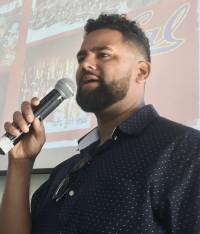 Joe Truss, Principal
Joe Truss, Principal
Visitacion Valley Middle School, San Francisco Unified School District, California
450 students (grades 6-8), 50 full-time staff
On supporting teachers: Truss said his role is all about connecting without controlling. “My number one job is making sure [teachers are] OK and seeing how they're doing and giving them what they need. And then priority two is giving them the space to figure it out as opposed to giving some mandates. With something that’s so crazy, like a sudden rush to remote learning and a pandemic going on in the background, you're going to need an innovative answer. And folks need time and space to innovate and create.” His approach models how he wants teachers to treat students. “Because primarily with the kids, they should be connecting and checking in and also innovating their curriculum," he said. "[Students] should be getting through this time, not worried about if they're going to fall behind or if they're going to pass or not pass. That shouldn't be anything that a kid is worried about when a hundred thousand people die.”
On self-care: “It’s a very stressful time for everybody, but, you know, I’m trying to breathe, taking it one day at a time, trying to exercise a little bit. I happen to have just had a kid, so if I hadn't have had a newborn, I probably would have been running and exercising. But we also were pregnant and stuck at home with a toddler, you know? So it's not like I just have free time, to get on the Peloton. It's been a time with my family. You do the best you can.”
Leadership Lesson: “Less is more. And, you know, people over profits, right? Connection over standards. There's certain things that matter and certain things that don't matter, especially under these situations. If you love your people, give them the space to figure it out. They'll figure it out. Whatever I can model, I can expect from folks. It allows folks to do that a little bit more if they see me willing to be vulnerable or willing to say, ‘I don't have it figured out’ or willing to say ‘It's not working out. It's not good. It's not fair.’ Then we can kind of have an authentic conversation. As opposed to me giving a party line, like ‘Everything’s under control, people. Pay no attention to the flames.’”
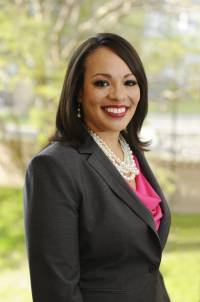 Sharon Contreras, Superintendent
Sharon Contreras, Superintendent
Guilford County Schools, North Carolina
73,000 students, 8,972 full-time staff
On technology and equity: According to Contreras, 20 percent of her district’s families do not have enough devices in the home for each child, and approximately 15 percent of students do not have access to cable modems or high speed internet. To fill in the gaps during emergency distance learning, Guilford County Schools distributed more than 17,000 devices to students and sent 40 smart buses into neighborhoods to provide Wi-Fi. Still, about 2,300 students never logged on, and thousands of others logged on only sporadically. “A lot is falling on school districts to try to resolve. And I think that school districts have done so much that parents believe it's our responsibility to provide broadband connectivity,” Contreras said, but she believes educators need to help shift that expectation. “It's the responsibility of federal government and the state government to make sure that the citizens of this country have high speed internet because there are very few things you can do any more without internet," she said. "It is something that is an essential service — a public good that is necessary, required, like electricity and water. It should not be treated as a luxury.”
On self-care: Contreras said that the high-stress demands of the superintendent role makes self-care important but hard to achieve. “I would say that I'm a work in progress. But I wake up each morning, and I read the Bible, and I'm particularly inspired by The Message version of the Bible, which is plain, modern English. And then I walk three to five miles a day, exploring our county’s beautiful parks and nature trails. And during the pandemic, I started gardening and I enjoy the peace and joy that gardening brings to my life now.”
Leadership lesson: “You know, I'm a problem solver. A fixer. A real life Olivia Pope,” said Contreras. “I've had great success my entire career with addressing very complex problems and issues. And I learned I cannot fix the chaos that has ensued since the start of this pandemic. I can't give students and my faculty and staff, my families, their lives as they once knew them back.” Despite that reality check, she is inspired by the innovations sparked by the pandemic, such as her district’s rapid creation of a virtual school that will remain an option after the coronavirus outbreak. “While I cannot fix some of the issues that the pandemic caused,” she said, “I absolutely believe in radical hope. I believe we will create a better educational system. It will not be easy. But it will be relatively faster than the 300 plus years that we’ve lived in the current one. So I’m still optimistic.”
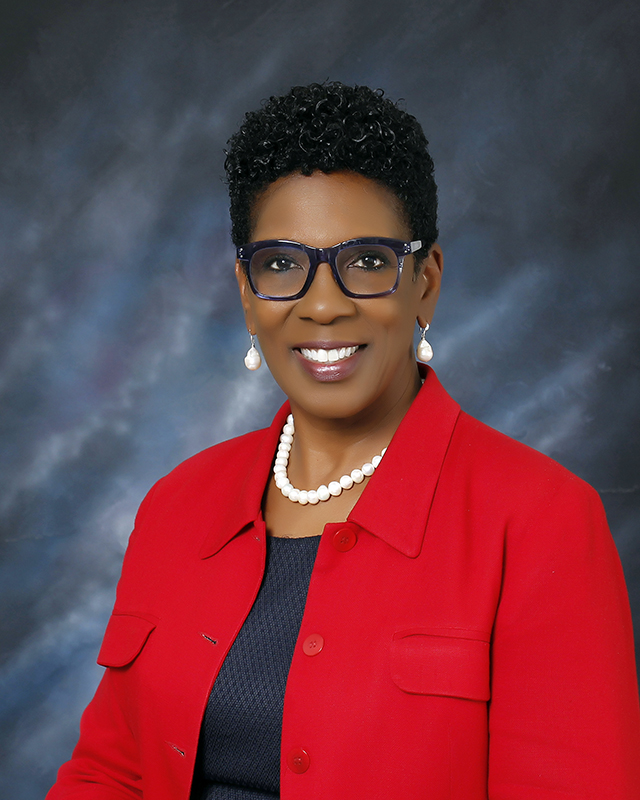 M. Ann Levett, Superintendent
M. Ann Levett, Superintendent


 Francisco Durán, Superintendent
Francisco Durán, Superintendent Sonal Patel, Assistant Superintendent of Educational Services
Sonal Patel, Assistant Superintendent of Educational Services Joe Truss, Principal
Joe Truss, Principal Sharon Contreras, Superintendent
Sharon Contreras, Superintendent